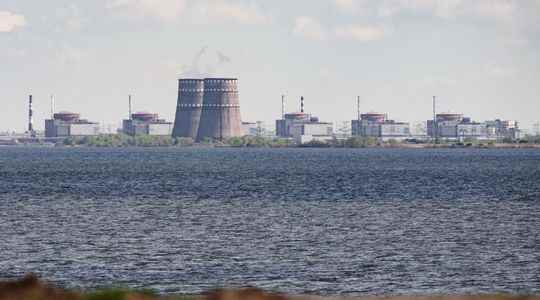The fate of the Zaporijia nuclear power plant has not finished giving Westerners cold sweats. During the day of Thursday, August 25, fires caused by bombardments led the site, controlled by Russian forces, to be “totally disconnected” from the Ukrainian national network. A first since the commissioning of the industrial complex, nearly forty years ago, which raised fears of an accident in the largest nuclear power plant in Europe. The installation was finally connected on Friday, after checks to ensure that the site’s security systems were operating normally.
In recent weeks, the plant has been the target of several bombardments, for which Russians and Ukrainians blame each other. Falling into the hands of Putin’s army in March, this war prize is of definite strategic interest to the head of the Kremlin. “It’s a new form of blackmail at the civil nuclear risk, points out Marie Dumoulin, former diplomat and director of the Wider Europe program at the European Council for Foreign Relations (ECFR). Her calculation is probably to arouse fear of an accident in the West, in order to push them to put pressure on Ukraine to cease its military activities in this area.”
fear lever
At a time when Russian ammunition and fuel depots are the target of methodical and almost daily strikes by Ukrainian precision artillery, the Russian army has not hesitated to store military equipment on site, hoping to avoid shots. In mid-August, Petro Kotin, the president of Energoatom, the Ukrainian national nuclear energy production company, had thus accused Moscow of having “installed missile firing systems” inside the power plant and of ” hit the Nikipol district from this place”. “This creates a form of stronghold for Russia, which the Ukrainians will find difficult to recover, because the risk of hitting the plant itself is very high”, underlines Marie Dumoulin.
At the beginning of August, the boss of Energoatom had also accused Russia of trying to connect the plant – which includes six of the 15 Ukrainian nuclear reactors – to the electricity networks of Crimea, annexed by Moscow in 2014. “To do this, it is necessary to first damage the power lines of the power plant connected to the Ukrainian energy system. From August 7 to 9, the Russians have already damaged three power lines. At the moment, the power plant is operating with only one production line, which is a mode of extremely dangerous work,” he warned on Ukrainian television.
“Putin knows very well that this situation arouses fear, because we still have in mind the tragedies of Chernobyl or more recently of Fukushima, notes Héloïse Fayet, researcher at the French Institute for International Relations (Ifri), specialist in nuclear proliferation issues. But beyond this type of consideration, owning this plant also has the tactical advantage of depriving Ukraine of a significant part of its electricity production capacity.”
“Double-edged weapon”
Faced with fears raised in recent weeks by the deterioration of the security situation at the site, the adviser to the Ukrainian Minister of Energy, Lana Zerkal, indicated on Thursday that an inspection mission from the International Energy Agency atomic (IAEA) was expected in the plant “next week”. For their part, the United Nations had previously called for “demilitarization” of the area to eliminate any risk for nuclear installations, and to allow the dispatch of international inspectors.
A sign of the ambient concern, French President Emmanuel Macron issued a warning on Friday on the sidelines of his trip to Algiers: “War in no case should undermine the nuclear safety of the country, of the sub-region and of all of us. Civil nuclear power must be fully protected.” An accident at the Zaporizhia nuclear power plant, however, would not only be catastrophic for Ukraine and Europe, experts note. “Having control of this power plant is a double-edged sword: well used, it can certainly be used as a means of pressure, underlines Héloïse Fayet. However, in the event of an accident, its proximity to Russia would also have extremely harmful consequences for this country.”
